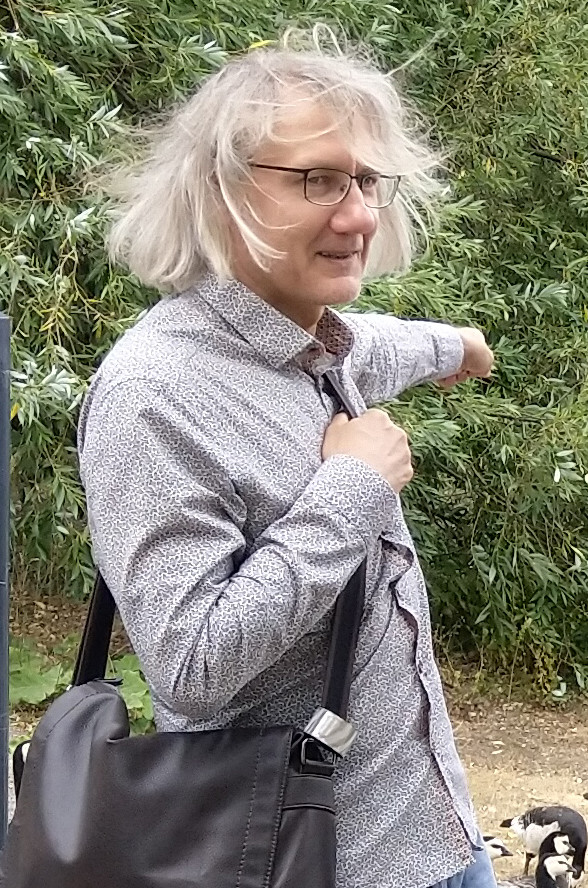Kalju Kruusa
Kalju Kruusa (b. 10.10.1973 in Tallinn; real name Jaanus Valk) is an Estonian poet, editor and translator, described by Hasso Krull as one of those “poets who almost never go public.”
An eternal student since 1993 (with very little breaks in between), he has studied English Philology, Semiotics, French, Romance Studies, Japanese and Translation at the University of Tartu, Tallinn University and Waseda University in Tokyo, Japan. He wrote his B.A. thesis on the French Symbolist poet Mallarmé (2008) and his M.A. thesis on the linguistic conditionality and the translatability of metrical systems and poetic forms, drawing evidence from Japanese haiku and their Estonian translations (2016).
Kalju Kruusa’s poems became first published in 1996, in the daily newspaper Postimees. He was one of those among the students of Estonian philology and of English philology at the University of Tartu who founded the literary group Erakkond (Hermitkind) in 1996. The “hermits,” as it were, started off with two joint-collections Üheksavägine (Great Mullein, 1997) and Harakkiri (Magpie’s Prints, 1999), to carry on with their individual books, both prose and poetry, forming “the new wave of the 1990s” in the Estonian literary field.
Kalju Kruusa has published eight personal poetry books Meeleolu (‘Frame of Mind’, 1999), Treffamisi (‘Encounters’, 2004), Pilvedgi mindgi liigutavadgi (‘I Am Carried Away by the Clouds’, 2008), Tühhja (‘Nothing’, 2010), 灵血茶(ing·veri·tee) (‘Ginger Tea’, 2013), Äädikkärbsed (‘Fruit Flies’, 2015), Kümme kükki (‘Ten Squats’, 2018) and Üleelamiste vanake (‘The Challenges of an Old Man’, 2023). The year 2017 saw the release of his selected poetry Ühe inimese elu (pooleli) (‘The Life of a Man [Halfway Through]’).
None of the books is a whole in itself. The sole and only principle of their composition is that of the chronological order, with every poem tagged with the date and place of its writing. Kalju Kruusa’s poetry is in a continuous change, yet the borders between each book are simply contingent, often they overlap. There are no thematic chapters in any of the books, and for the most part, the texts flow in a row without page breaks.
With Hasso Krull, he founded the web magazine of poetry in translation called Ninniku (www.eki.ee/ninniku) in 2001 and remained its co-editor until 2010. He has translated plays, prose and poetry from Chinese, English, Finnish, French, Italian, Japanese and Korean into Estonian.
Kalju Kruusa has been awarded the Betti Alver Prize (1999), the cultural weekly Sirp award for criticism (2001), the literary monthly Looming award for poetry (2006, 2020), the Gustav Suits Poetry Prize (2008), the Tallinn University Literary Award for translations (2009), and the Estonian Literature Endowment Annual Award (for the poetry collection Tühhja, 2011). He was selected as a recipient of the Estonian writer’s salary for three years from 2019 until 2021.
Kalju Kruusa
Books in Estonian
Poems
Meeleolu: esikkogu. Tsitre: Erakkond, 1999, 79 lk.
Treffamisi: teisiluuletusi. Tallinna: Tuum, 2004, 79 lk.
Pilvedgi mindgi liigutavadgi. Tallinna: 9 Koma, 2008, 119 lk.
Tühhja. Tallinna: Ussimunni, 2010, 91 lk. [Luuletused ja tõlked.]
灵血茶(ing·veri·tee): oma luulet ja tuttavat. Tallinna: Säutsipau, 2013, 107 lk. [Luuletused ja tõlked.]
Äädikkärbsed: oma luulet ja tuttavat. Tallinna: Kirimiri, 2015, 121 lk. [Luuletused ja tõlked.]
Ühe inimese elu (pooleli): valitud luuletusi. Tallinna: Kirimiri, 2017, 208 lk.
Kümme kükki. Tallinna: Kirimiri, 2018, 127 lk. [Luuletused ja tõlked.]
Üleelamiste vanake. Tallinn: Kultuurileht (Loomingu Raamatukogu), 2023, 58 lk.


